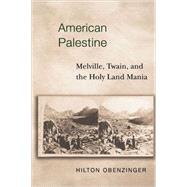American Palestine
, by Obenzinger, Hilton- ISBN: 9780691009735 | 0691009732
- Cover: Paperback
- Copyright: 10/25/1999
In the nineteenth century, American tourists, scholars, evangelists, writers, and artists flocked to Palestine as part of a "Holy Land mania." Many saw America as a New Israel, a modern nation chosen to do God's work on Earth, and produced a rich variety of inspirational art and literature about their travels in the original promised land, which was then part of Ottoman-controlled Palestine. InAmerican Palestine, Hilton Obenzinger explores two "infidel texts" in this tradition: Herman Melville'sClarel: A Poem and Pilgrimage to the Holy Land(1876) and Mark Twain'sThe Innocents Abroad: or, The New Pilgrims' Progress(1869). As he shows, these works undermined in very different ways conventional assumptions about America's divine mission. In the darkly philosophicalClarel, Melville found echoes of Palestine's apparent desolation and ruin in his own spiritual doubts and in America's materialism and corruption. Twain's satiric travelogue, by contrast, mocked the romantic naiveteacute; of Americans abroad, noting the incongruity of a "fantastic mob" of "Yanks" in the Holy Land and contrasting their exalted notions of Palestine with its prosaic reality. Obenzinger demonstrates, however, that Melville and Twain nevertheless shared many colonialist and orientalist assumptions of the day, revealed most clearly in their ideas about Arabs, Jews, and Native Americans. Combining keen literary and historical insights and careful attention to the context of other American writings about Palestine, this book throws new light on the construction of American identity in the nineteenth century.







